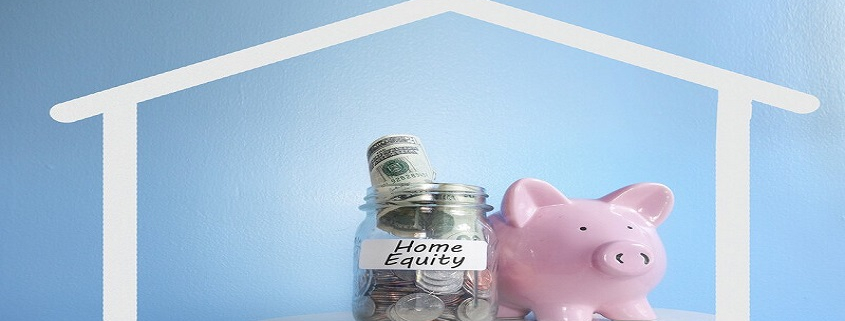Should You Tap Home Equity To Pay Your Bills?
Carrying debt is rarely a good idea even in the best of times, but it can be especially damaging when interest rates are rising.
Higher rates mean increased costs for borrowers. If you have piled up expensive credit card debt or other obligations, your monthly payment might continue to swell as interest rates march higher.
Some people may be tempted to use the equity they have built in their home to eliminate the outstanding debt. But is that a good idea? Before making such a move, it is important to understand the pros and cons of using home equity.
How To Use Home Equity To Pay Off Debt
In recent years, home values have soared in many parts of the country. That means millions of homeowners – even those who are deep in debt – have likely built up quite a bit of equity in their homes.
Your home’s equity is the amount your property is worth, minus the dollar amount of the mortgage that remains on the property. There are several ways to use this home equity to pay off debts, which include:
- Cash-out refinance. A cash-out refinance allows you to use your home’s equity to borrow for a larger amount than your original mortgage. You can use that extra money for any purpose you like, including paying off debt.
- Home equity loan. This type of loan provides you with a lump sum that typically must be paid back at a fixed interest rate. The loan is based on the equity in your home, and the home itself serves as collateral.
- Home equity line of credit. Also known as a HELOC, this type of borrowing tool works much like a credit card in that you are allowed to borrow up to a certain limit and must pay back what you owe at regular intervals. Although similar to a home equity loan, a HELOC usually features variable rates that change over time.
Pros and Cons of Using Home Equity To Pay Off Debt
Perhaps the biggest advantage of using home equity to consolidate and pay off debt is that you might significantly lower the interest you pay.
“Typically, it’s a lower rate than credit cards or personal loans, which can result in savings over time,” says Kevin Lum, a certified financial planner and founder and CEO of Foundry Financial in Los Angeles.
For example, it is likely that a home equity loan or HELOC will have an interest rate that is much lower than the rate you would pay on credit card debt.
In addition, using home equity to consolidate your debts can offer you greater convenience.
“It allows you to consolidate your debt into one manageable monthly payment,” Lum says.
However, using home equity to pay off debt also has its drawbacks. When you borrow against your home’s equity, the home itself serves as collateral. If you fail to make your debt payments, you could lose your home to foreclosure.
“This is the most significant risk associated with using home equity to pay off debt,” Lum says. “Home equity loans often have longer repayment periods than other types of debt, “which means you could be paying off this debt deep into retirement.”
Catherine Valega, a certified financial planner and wealth consultant with Green Bee Advisory, says those who borrow against the equity in their home need to remember that the money is not a gift.
“It’s not a free pass – you still have to make the loan payments,” Valega says. “So, your cash flow must have the room to allow you to make the extra payments.”
Home Equity Loan vs. HELOC
A home equity loan and a home equity line of credit both let you borrow against the equity you have built up in your home. But some important differences separate these two types of borrowing.
With a home equity loan, your ability to borrow comes in the form of a lump sum payment. Typically, the loan will have a fixed rate, and you will gradually pay off the loan at that rate.
A home equity line of credit offers a set amount of money that you can borrow from at any time during what is known as the “draw period.” Once you enter the repayment phase, you can no longer access the line of credit and must pay back your HELOC’s principal and interest balance. Usually, a HELOC has a variable rate. That means that over time, your payments could grow larger – or smaller – as interest rates change.
How To Apply For A Home Equity Loan
Each lender has its own rules regarding how to apply for a home equity loan. As with any loan, the strength of your credit profile will largely determine whether you are approved and at what rate. In addition, a higher score might give you access to more of your equity.
Be sure to examine your credit report to make sure there are no errors. Once you are satisfied that your score is in good shape, compare lenders to get the loan you need at the best rate. By law, each lender is required to provide you with a loan estimate that comes in a standard format, making it easier to compare loan offers from various lenders. The estimate contains:
- The terms of the loan.
- The interest rate you will be charged.
- Closings costs and other fees.
During the application process, the lender will likely have your home appraised to establish its worth.
You might need to provide additional information, such as:
- Gross monthly income.
- Property taxes, insurance costs and homeowners association dues.
- The date the home was built.
If your loan is approved, you will then close on the loan and have access to the cash.
Should You Use A Home Equity Loan?
Your individual goals and circumstances will determine whether a home equity loan is the right choice for you. The best candidates are those who:
- Have a substantial amount of equity built up.
- Have a strong credit score and a low debt-to-income ratio.
- Want the security of a fixed interest rate – as opposed to the adjustable rate that is likely to come with a HELOC – and monthly payments that do not change.
However, even if using a home equity loan to pay off debt seems like a good option, Lum cautions against using this as a simple Band-Aid for your debt problems.
“If you haven’t gotten the root cause under control, you’ll be back in the exact same situation in the future – except it could be much worse,” Lum says.
Alternatives To A Home Equity Loan For Debt Consolidation
Although using a home equity loan to pay off debt can be an effective strategy for some, other options might be better.
Some people find that a home equity line of credit offers more flexibility than a home equity loan. With a HELOC, you can tap the equity only if and when you need it, and in the precise amount.
In some cases – particularly if the debt is smaller – you can become debt-free simply by cutting back on spending and using all available extra income to pay down debt as aggressively as possible.
“Cut expenses and create an additional income stream to begin paying off your debt at a more rapid pace,” Lum says. He suggests developing a side hustle or taking a second job as good methods of generating more money.
Another option is to sell assets to raise cash to pay off your debts. Valega also suggests borrowing from loved ones as a cheaper alternative to tapping your home equity.
“I’m a big fan of intrafamily loans,” Valega says. “Such loans have interest rates established by the IRS and known as the applicable federal rate, which tends to be much lower than what you’ll find in the current market options.”
Lum also suggests rolling over your debt to a credit card that offers an interest-free promotional period for several months or longer.
Finally, you could consider a debt consolidation loan.
“These are personal loans that combine all your debts into one loan with a potentially lower interest rate,” Lum says.
Source: U.S. News & World Report





